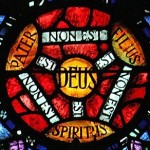We run our website the way we wished the whole internet worked: we provide high quality original content with no ads. We are funded solely by your direct support. Please consider supporting this project.

God’s Way of War
As Judah was facing impending doom, the Lord told Hosea that he would save them “not by bow, sword or battle, or by horses and horsemen, but by the LORD their God” (Hos 1:7). So too, through the Psalmist the Lord encourages his people by saying:
Do not put your trust in princes,
in human beings, who cannot save.
When their spirit departs, they return to the ground;
on that very day their plans come to nothing.
Blessed are those whose help is the God of Jacob,
whose hope is in the LORD their God (Ps. 146:3-5).
Along these same lines, it was undoubtedly to buttress his people’s trust in him rather than the sword that the Lord instructed his people ahead of time that, if and when they decide to have a king, they should not allow him to amass a large army, (Deut. 17:16). For while “[s]ome trust in chariots and some in horses,” Israelites were to “trust in the name of the LORD our God” (Ps. 20:7). Despite all appearances to the contrary, the Psalmist is convinced that “[n]o king is saved by the size of his army” and “no warrior escapes by his great strength.” Yet, “the eyes of the LORD are on those who fear him” and whose “hope is in his unfailing love” to “deliver them from death” (Ps. 33:16-19). Because he trusts in the Lord, another writer confesses, “I put no trust in my bow, my sword does not bring me victory” (Ps. 44:6). And despite his sinful proclivity to trust in armies, even David was, at least at one point, confident that “it is not by sword or spear that the LORD saves” (I Sam. 17:47).
We find this theme illustrated in a number of biblical stories. For example, during Israel’s famous battle against the Amalekites, Yahweh had Moses intercede for warriors on a hill while the battle was taking place. As long as Moses’ hands were raised, the Israelites would gain the advantage, but as soon as his arms were lowered the Israelites would begin to lose (Ex. 17). The point of this rather bizarre story, clearly, is that the outcome of Israel’s battles had nothing to do with their military strength or fighting skills. It rather depended on the Lord, who in turn had chosen to rely on prayer, to some extent, to accomplish his goals.
The same point is made in the story of Gideon’s army. As they were about to face an enormous coalition of anti-Israeli forces, Yahweh had Gideon gradually reduce his army from 32,000 to 300 (Judg. 7). In the end, Yahweh gave Gideon the victory by using Gideon to turn the aggression of his enemies on themselves (Josh. 7:20-24). God’s primary way of overcoming violence and all forms of evil has always been to turn it back on itself, illustrating Jesus’ teaching that if you live by the sword, you die by the sword (Matt 26:52). Presently, however, we simply need to note the manner in which the story illustrates God’s on-going effort to get his people to abandon their confidence in the sword and to rather place their trust in him.
While the Lord frequently promised to bless those who trusted in him, he also frequently pronounced woe on all who instead chose to find their security in the sword. Hence, for example, to the Israelites who were seeking protection from Assyria by forging military alliances with Egypt, the Lord declared:
Woe to those who go down to Egypt for help,
who rely on horses,
who trust in the multitude of their chariots
and in the great strength of their horsemen,
but do not look to the Holy One of Israel,
or seek help from the LORD (Isa 31:1).
Similarly, through Hosea the Lord tells his people that they “have planted wickedness” and “have eaten the fruit of deception” because “you have depended on your own strength and on your many warriors.” For this reason, he says, “your fortresses will be devastated” and “mothers” will be “dashed to the ground with their children” (Hos. 10:13-14). The passage clearly reflects God’s accommodation to Hosea’s interpretation of how this will happen, for Hosea depicts God as directly behind this atrocity. Yet, the passage nevertheless bears witness to God’s true desire for his people to place no trust in military might.
Along these lines, we should recall that David was punished precisely because he gave into Satan’s temptation to calculate how much military power he had (1 Chron. 21). Despite the fact that Yahweh is frequently depicted as helping David successfully wage war against the Philistines and other threatening nations, he nevertheless refused to allow David to build his temple because, he said, “you are a warrior” who has “shed much blood on the earth in my sight” (I Chron. 22:8; 28:3). Given that the temple was regarded as the place where God uniquely dwelt, this prohibition bears witness to the fact that, while the incarnational God was not above condescending to wear the mask of a violent warrior deity as he furthered his sovereign purposes through David, this is not where he actually lives. His true tabernacle, manifested perfectly in Jesus Christ in whom he fully dwelt (Jn 1:14), is rather characterized by self-sacrificial love and the shunning of all violence.
Finally, despite his concessions to violence, we find throughout the OT narrative that Yahweh “tries to control, circumscribe and harness it,” as Goldingay notes. Hence, for example, in contrast to the way war was typically waged in other ancient Near Eastern cultures, Yahweh is often portrayed as prohibiting soldiers from using war as an occasion to advance their own self-interests (e.g. pillaging) or satisfying personal decadent desires (e.g. raping). Similarly, Yahweh forbade those who served as temple priests to engage in violence. When the New Testament later refers to the body of Christ as a royal priesthood, this is at least part of what it has in mind. While non-followers of Jesus may consider the use of violence in certain “justified” circumstances to be necessary, if not praiseworthy, the royal priesthood of Jesus followers are called and empowered to bear witness to God’s non-violent ideal by altogether abstaining from it.
Image by Mayur Gala.
Category: General
Tags: God, Non-Violence, Old Testament, War
Topics: Enemy-Loving Non-Violence
Related Reading

Does the Doctrine of the Trinity Matter?
Jesus reveals the greatest, most beautiful, and mysterious aspect of God when he, despite being himself God Incarnate, relates to God as his “Father” and refers to God as “the Holy Spirit.” There is, of course, only one God (1 Cor 8:6). Yet Jesus reveals that God somehow exists as Father, Son and Holy Spirit.…

Did Jesus Have Two Minds?
As I laid out in the previous post, I believe Jesus is fully God and fully human. The question is: How is this possible? How do we talk about the way that Jesus was fully God and fully man? The Creed of Chalcedon (451) tries to answer the question this way: We, then, following the…

A Guide to the Book of Revelation
Marc Nozell via Compfight Kurt Willems posted this excellent guide for reading the Book of Revelation as it was intended to be read. As Kurt points out, this is the most misunderstood and misinterpreted book of the Bible. If you were weaned on A Thief in the Night or the Left Behind series of books,…

Should a Christian Serve as a Military Chaplain? (podcast)
Greg argues that both hot water and cold water are good. Episode 530 http://traffic.libsyn.com/askgregboyd/Episode_0530.mp3

Why Vegetarianism Instead of Veganism?
Greg talks about vegetarianism and veganism. http://traffic.libsyn.com/askgregboyd/Episode_0054.mp3

